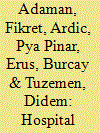|
|
|
Sort Order |
|
|
|
Items / Page
|
|
|
|
|
|
|
| Srl | Item |
| 1 |
ID:
114316


|
|
|
|
|
| Publication |
2012.
|
| Summary/Abstract |
Based on data from a face-to-face survey of 2422 residents from urban Turkey, this paper presents an analysis of citizens' preferences in Turkey on nuclear and renewable energy sources. Findings indicate that opposition to nuclear power was strong, and only a small number of respondents endorsed it by listing it in their top two choices. Conversely, almost two-thirds of the sample endorsed investment in renewable energy sources (such as wind and solar), and only a small minority was opposed to it. Econometric analyses revealed that knowledge of the climate change problem was a common factor that explained endorsement of both nuclear and renewables. Yet, high levels of concern for the environment and a negative perception regarding its future differentiated the endorsers of renewables from those of nuclear energy. Endorsers of nuclear energy were found to be males who were knowledgeable about climate change and engaged in environmental issues, but less concerned about the environment, and optimistic about its future. Nuclear opponents, on the other hand, were found to be concerned about the environment, pessimistic about its future, and not fully relying on technology.
|
|
|
|
|
|
|
|
|
|
|
|
|
|
|
|
| 2 |
ID:
084679


|
|
|
|
|
| Publication |
2008.
|
| Summary/Abstract |
EU environment policy aims to promote sustainable development and to protect the environment for present and future generations. It is based on preventive action, the polluter pays principle, fighting environmental damage at source, shared responsibility and the integration of environmental protection into other EU policies. The acquis comprises over 200 major legal acts covering horizontal legislation, water and air quality, waste management, nature protection, industrial pollution control and risk management, chemicals and genetically modified organisms (GMOs), noise, and forestry. Compliance with the acquis requires significant investment. A strong and well-equipped administration at the national and local level is imperative for the application and enforcement of the environment acquis. . ..
|
|
|
|
|
|
|
|
|
|
|
|
|
|
|
|
| 3 |
ID:
091002


|
|
|
|
|
| Publication |
2009.
|
| Summary/Abstract |
This study analyzes patient characteristics that affect the choice between public and private healthcare providers in Istanbul. In addition to socioeconomic variables often considered, this study focuses on another factor that might determine the ease of access to hospital services in developing countries: the availability of social networks. The analysis is based on data from a household survey conducted in Istanbul. The econometric results provide some evidence that potential social ties play an important role in choosing public healthcare centers over private ones for minor health problems. This finding indicates that households with higher-level social networks might be using them in easing access to public facilities.
|
|
|
|
|
|
|
|
|
|
|
|
|
|
|
|
| 4 |
ID:
103616


|
|
|
|
|
| Publication |
2011.
|
| Summary/Abstract |
This paper explores Turkish urban households' willingness to pay (WTP) for CO2 emission reductions expected to result from improvements in power production. A face-to-face questionnaire, with a Contingent valuation (CV) module prepared using the double-bounded dichotomous choice elicitation framework, was administered to 2422 respondents representative of urban Turkey-a developing country with low but rapidly increasing greenhouse gas emissions. The determinants of WTP were identified by considering not only the impact of standard socio-economic factors but also the effects of environmental knowledge, attitudes and behaviour, the relevance of the identity of the collection agent (national versus international institutions) in terms of trust people have towards them, and the degree of perceived participation of others in the realization of the project. Our study confirms the existing literature in demonstrating that WTP figures reported by young and educated people that are active on environmental issues, and who also possess material security and environmental knowledge, are more likely to be high. However, their willingness to make contributions is hampered significantly by their belief that their fellow citizens will not contribute and the general lack of trust in institutions. Overall, this study may be taken as a call to eliminate governance-related uncertainties in climate change deals.
|
|
|
|
|
|
|
|
|
|
|
|
|
|
|
|
|
|
|
|
|